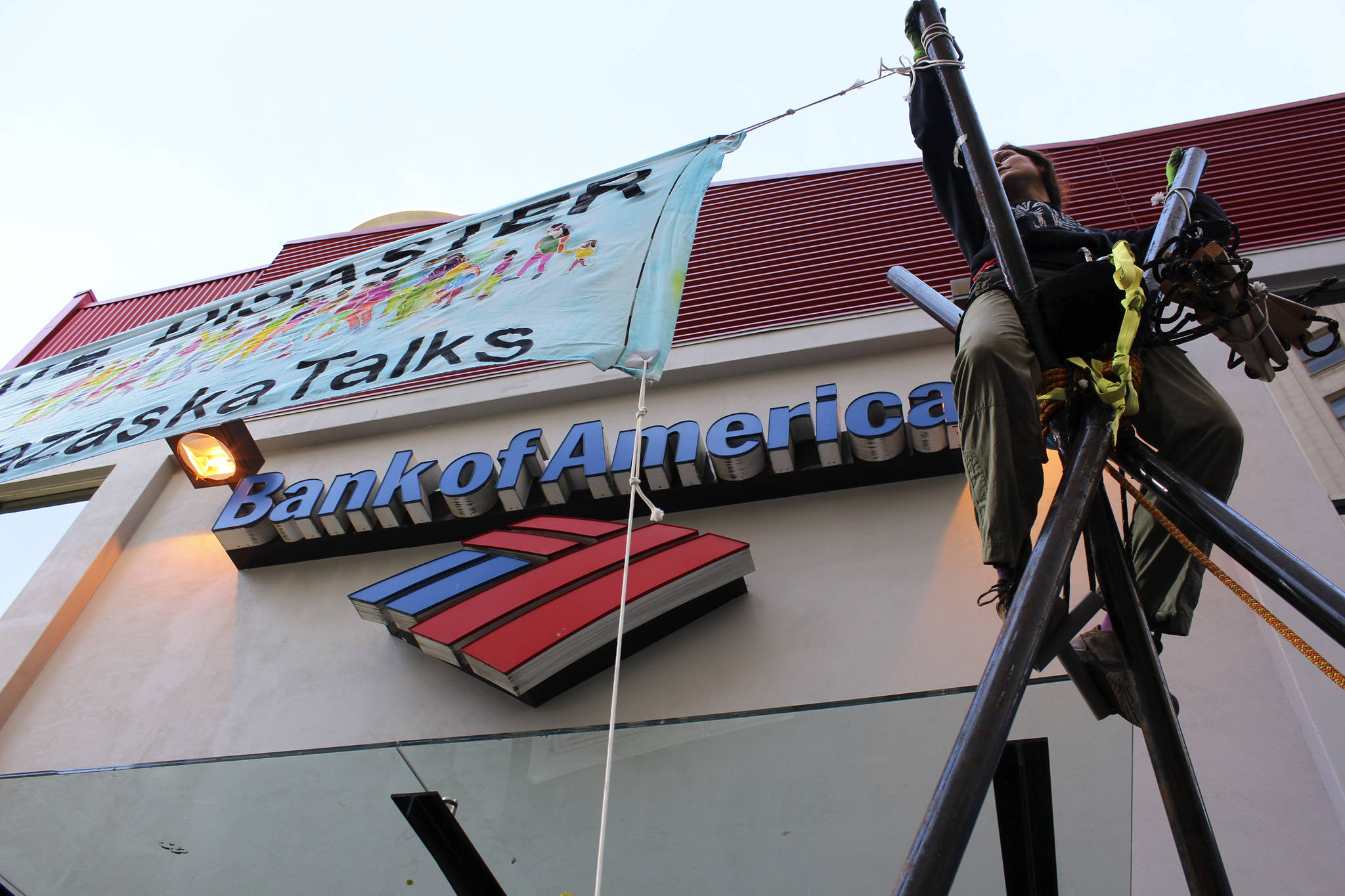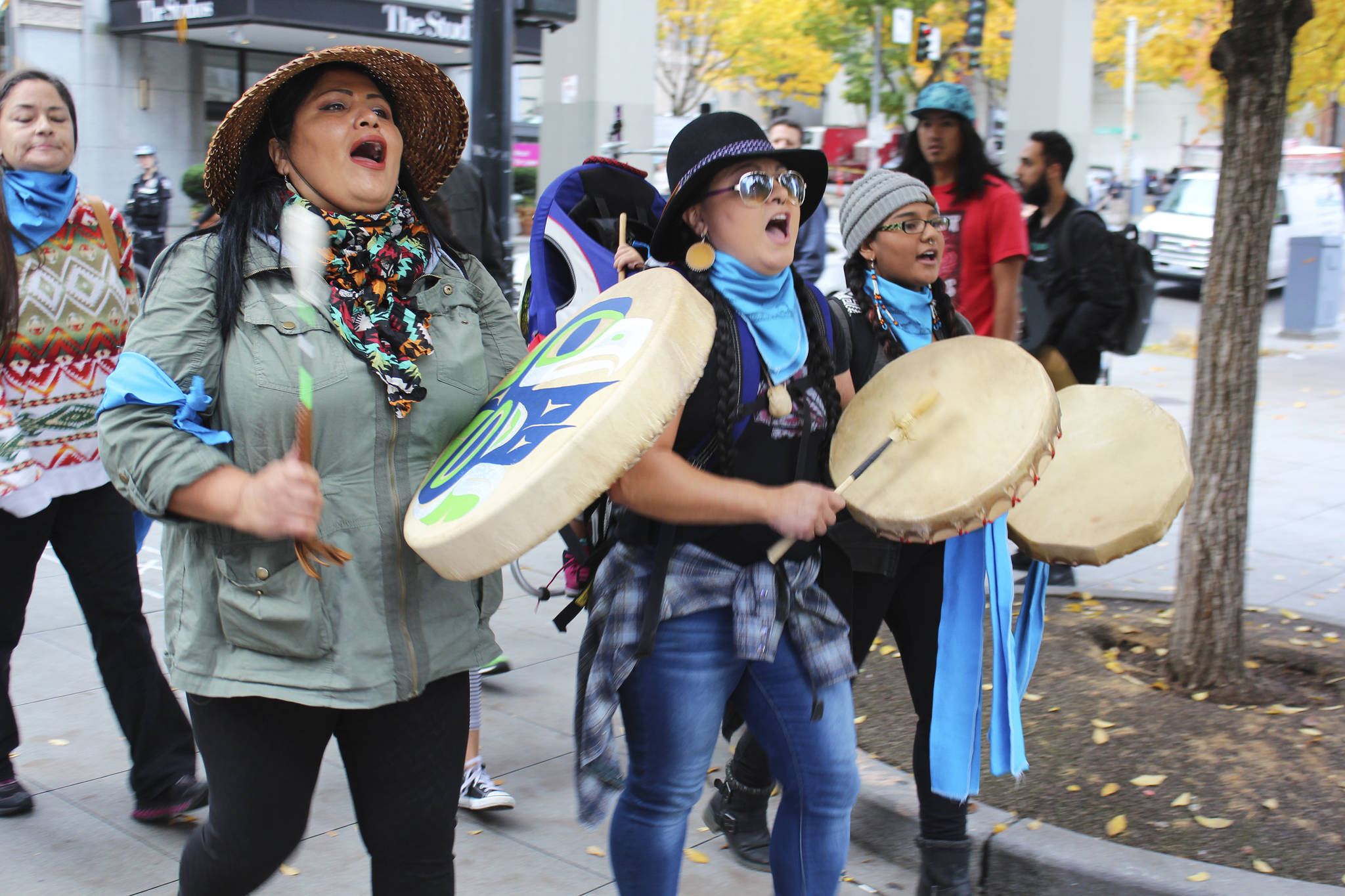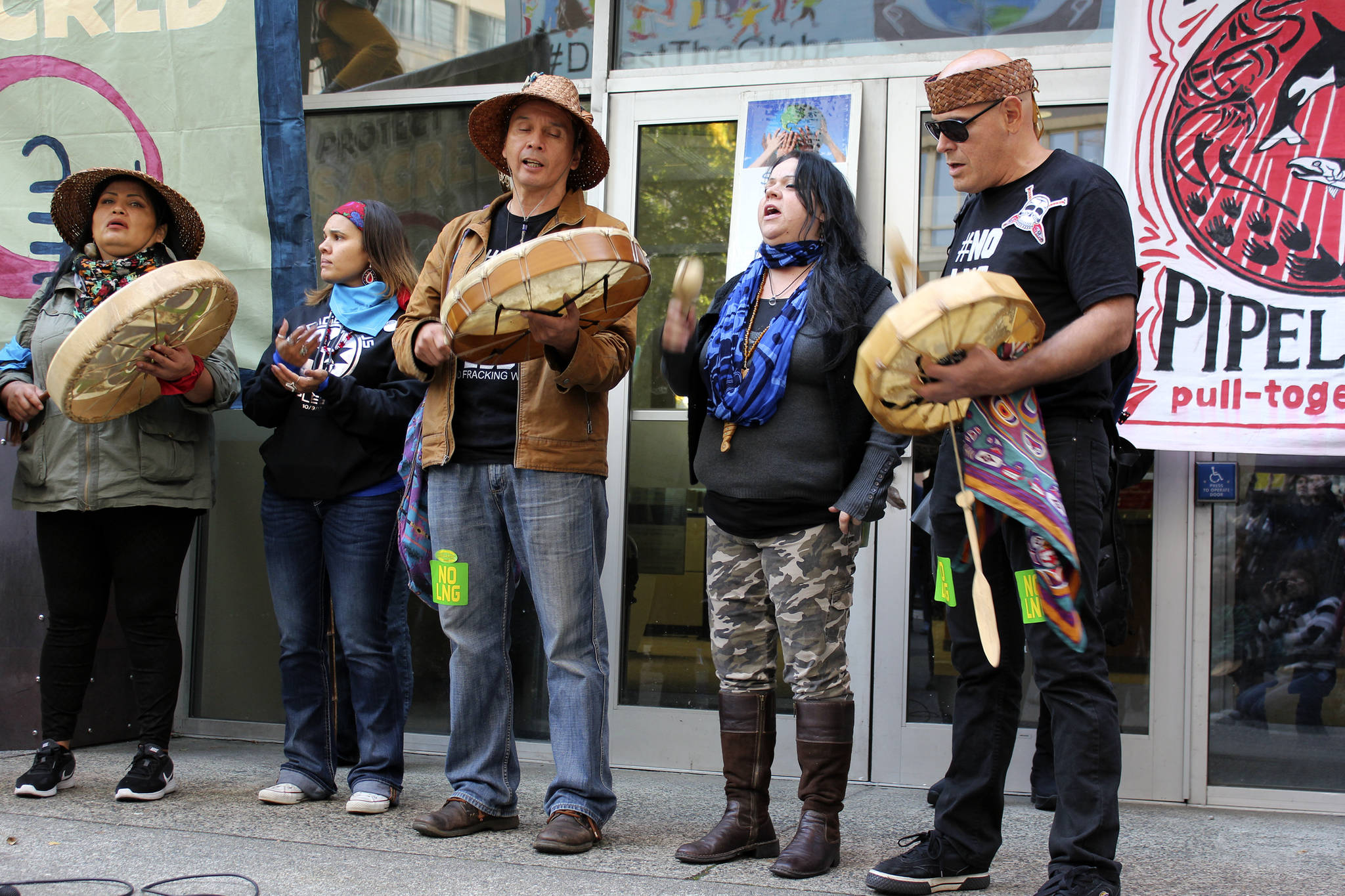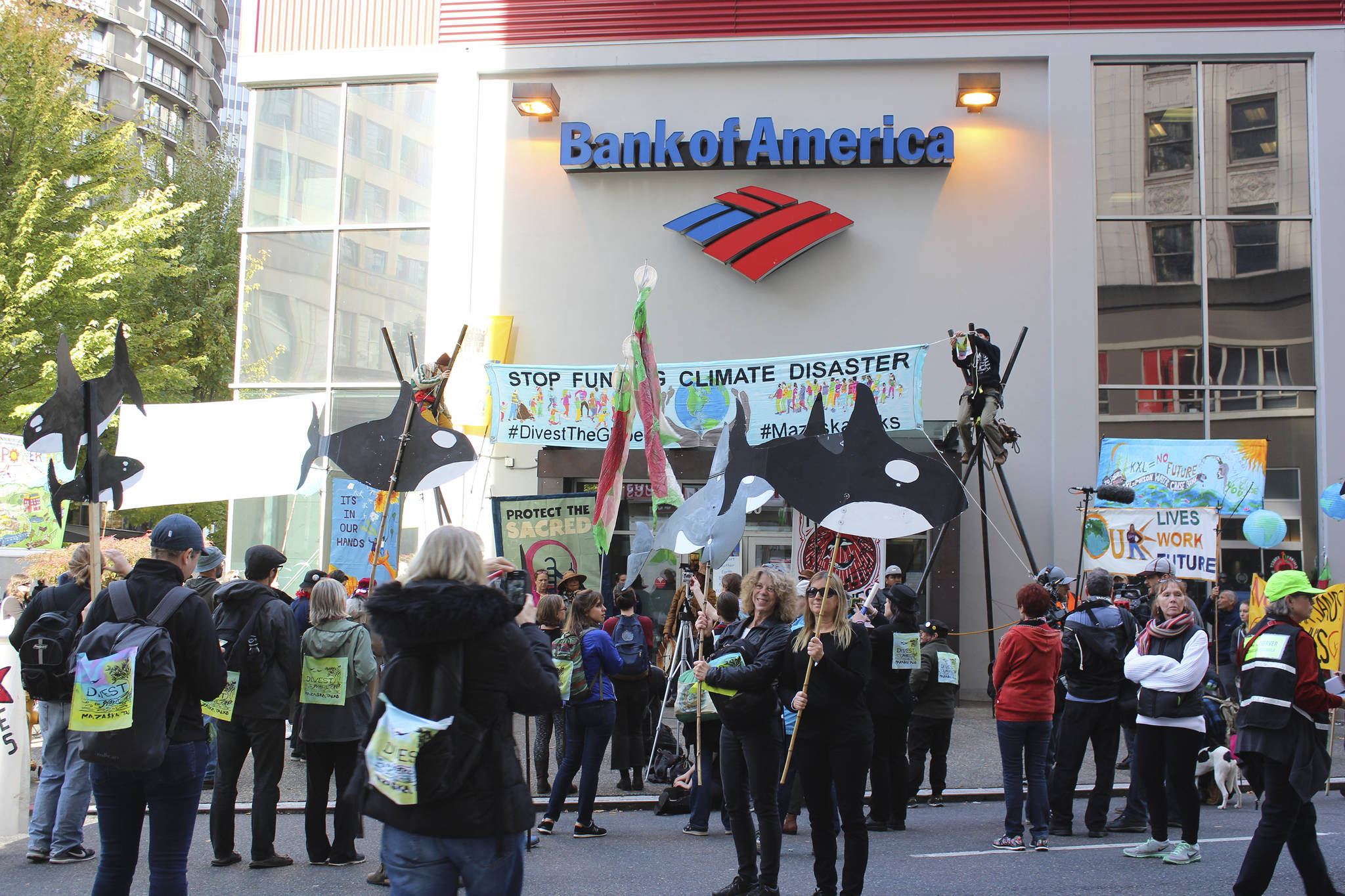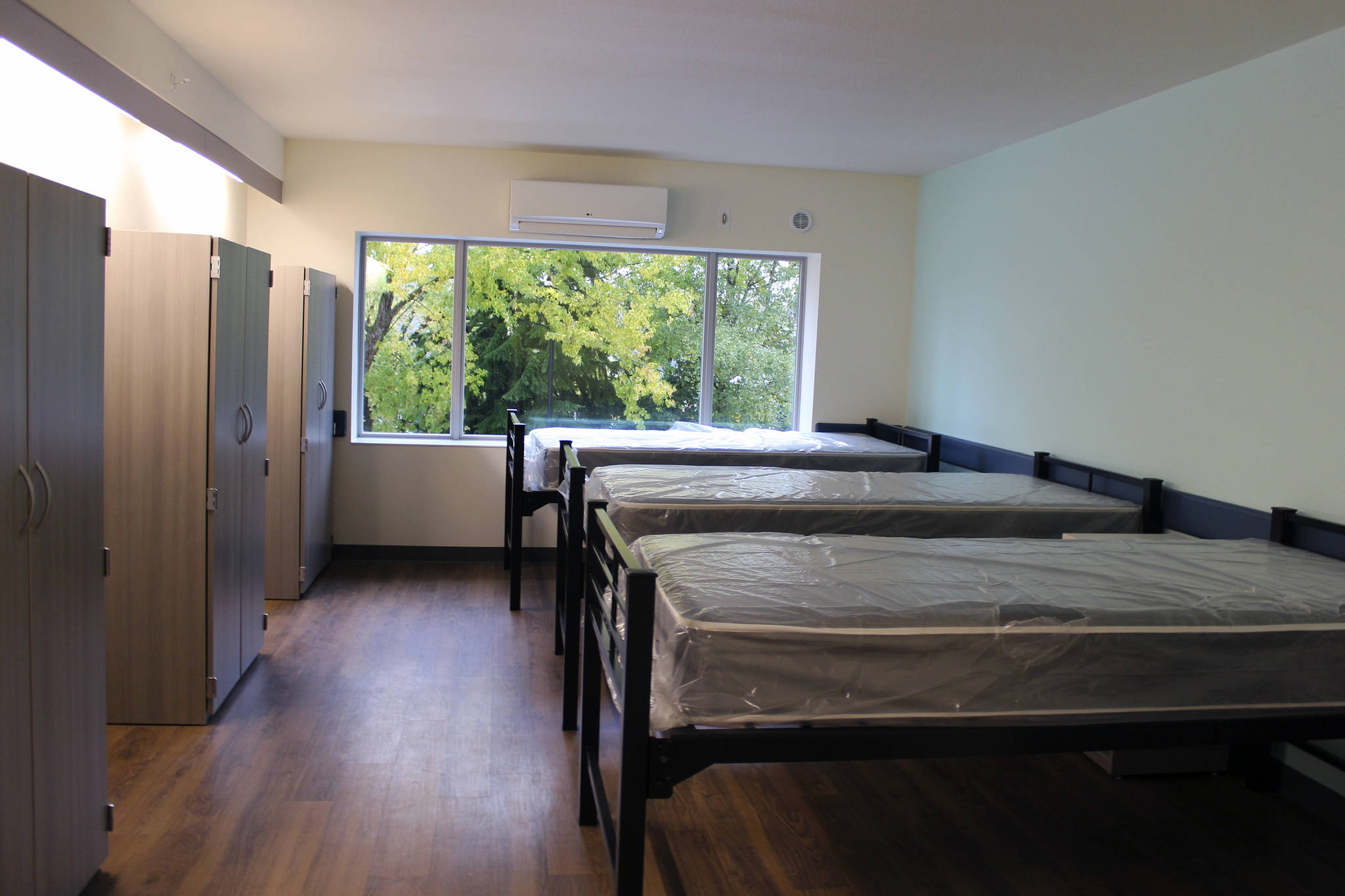Earlier this summer, after indigenous and climate activists shut down 13 different branches of JP Morgan Chase across Seattle in a single day to protest the bank’s financing of the Keystone XL pipeline, Muckleshoot tribal member Rachel Heaton, Lakota member Matt Remle, and 350 Seattle’s Alec Connon got on a three-way call. “We were kinda like, ‘Where do we go next? What do we do next? How do we escalate from simultaneously shutting down 13 banks?’” recalled Connon, in front of a small crowd at Westlake Park on Monday.
Remle and Heaton are co-founders of Mazaska Talks (the Lakota word for “money”), formerly the Defund DAPL Seattle Action Coalition, a group credited for successfully pressuring the Seattle City Council to vote to move the city’s $3 billion out of Wells Fargo this February, partly due to the bank’s financing of the Dakota Access Pipeline. “And Matt says, ‘We should have a National Day of Action,’” Connon continued. “And then Rachel goes, ‘No, no, it should be a Global Day of Action.’ And I was like, ‘Yeah, that’s great, but there’s only three of us on this call.’”
A few months later, those three became thousands, and not just in Seattle, but in 50 cities, four continents, and about a dozen countries across the world. According to Connon and Heaton, that makes “Divest the Globe,” a three-day global movement from October 23 to 25 to put pressure on the financial institutions making fossil fuel infrastructure possible, the biggest global protest of its kind—ever.
On Monday, 19 groups of activists fanned across Seattle—along with many other groups across dozens of cities in the U.S. and Canada—to disrupt business and “loudly,” Connon said, deliver a letter to managers of all 103 branches of the five banks operating in Seattle that have contributed money to tar sands projects: Wells Fargo, JP Morgan Chase, Bank of America, US Bank, and TD Bank. The letter, signed by a long list of indigenous and environmental leaders, promises that all of the undersigned will boycott those banks, as well as encourage all of their supporters to boycott those banks, until they withdraw funding from the tar sands.
Along with the 19 teams of letter-deliverers, another, larger group rallied in Westlake and then marched to three decidedly more disruptive actions at Bank of America at 5th Avenue and Olive Way, Chase Bank on 2nd Avenue and Union Street, and the Wells Fargo Center on 3rd Avenue and Marion Street. (Connon jokes that that particular location has got to be tired of the activists by now; it was repeatedly targeted during the campaign to get Seattle to move its money from Wells Fargo.)
“This movement is not separate from Standing Rock, it is an extension of it,” cried Heaton, standing in front of the Bank of America branch on Olive Way, its doors flanked by activists perched on tall poles and a banner that read STOP FUNDING CLIMATE DISASTER. A call to divest from the banks that fund the Dakota Access Pipeline came out of the Standing Rock movement almost a year ago now. So far, nearly $85 million in individual accounts and $4.3 billion in municipal accounts have been moved from banks that fund DAPL. “Divestment isn’t new,” she said. “The indigenous people having a voice, that is something new. … as indigenous people, our voices tend to get silenced. We are standing up for Mother Earth … we cannot live without her.”
The doors to the bank were locked behind Heaton. At one point, a man marched straight through a line of Native activists as they sang, and yanked on the front doors. They wouldn’t open. “We come here in prayer; we come here in peace,” Heaton said. “We can all choose where we put our money, we can all choose what we decide to invest in. And I’m sorry, but Bank of America is not where you want to be putting your money.”
Paul Cheoketen Wagner, a Saanich tribal member and longtime environmental activist, pointed to the series of events this summer that seem to mark a dramatic escalation in the effects of climate change: hundreds of record-breaking wildfires in British Columbia and Greenland; hurricanes in Texas and Puerto Rico and across the Carribbean. Any investor in fossil fuel projects at this stage, “their action is backwards,” he said. “Their action is backwards, it is wrong, it is ill. Their hearts have been robbed by their greed. … I used to say that we’re doing this for the grandchildren. But I won’t even say that anymore. I say, ‘We are just doing this for the children, today.’ It is that bad. It is that bad.”
In the early afternoon, Connon promised the three downtown bank branches featuring big demonstrations “will remain shut down until we are removed.” In the end, 7 protesters were arrested, KIRO reports.
Connon also told the Westlake crowd Monday that following Seattle’s decision to move its money from Wells Fargo, many other cities have followed suit, or at least are considering it, including San Francisco, Missoula, Mont., Davis, Calif., and Washington, D.C. A handful of banks have made similar anti-fossil-fuel pledges; ING Bank, for instance, the largest bank in Holland, recently announced it will not finance any projects out of the Canadian tar sands, and BNP Paribas, the second-largest bank in Europe, said it would no longer finance shale and oil projects.
“It is not a coincidence that these banks are doing this in the face of unprecedented pressure from customers and the public,” Connon said. “That’s what actions like this are about.”
Roxanne White, who was born and raised on the Yakima reservation, speaking in front of Bank of America, decried the destruction of landscapes and the contamination of water and air; “that affects not just us”—indigenous peoples—“but all of you,” she said. “I think of my grandson, Mateo. I think of his future. … What are we leaving for them? … I look around this crowd and I think, man, these streets should be full. These streets should be full.”

